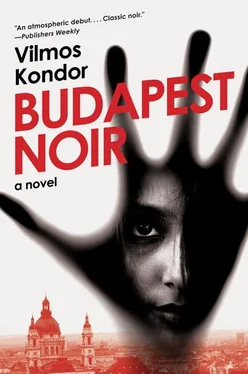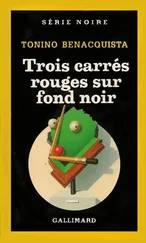“You may ask. I’ve got to talk to Jenő Strausz.”
“And it can’t wait until tomorrow? Or until you’re once again in shape to go out in public?”
“It can’t wait,” he said, staring right back at Krisztina.
“Then maybe I can’t wait, either, Zsigmond,” said Krisztina, throwing down the gauntlet. “I’ll accept Penguin’s offer. And go to London.”
“First help me get dressed, will you?” Gordon had managed to slip on his trousers, but getting his shirt on by himself was impossible. After a moment’s hesitation, Krisztina helped him put it on. She tied his necktie, buttoned his blazer, and even put his coat on him. Gordon went out to the vestibule, where, with his left hand, he put on his hat. But the motion made him stagger, and he fell against the wall. His face winced in pain. Krisztina couldn’t take any more of this. She grabbed her own coat off the coat hanger and picked up her purse.
“And where are you off to?” asked Gordon.
“If you think I’m going to keep helping with this rubbish of yours, helping you destroy yourself, you’re sadly mistaken.” With that, she slammed the door behind her and stormed off.
It was a clammy, rotten morning. The sidewalk was slippery from the drizzling fog, forcing Gordon to give up his plan to walk to the Sztambul. It took him a good fifteen minutes to reach Berlin Square. There he boarded a tram, sat down, and stared out at the city in its autumn guise. Pretty young girls holding tennis rackets were strolling across the Margaret Bridge. But Gordon didn’t even try to crane his neck for a better look. Pulling himself to his feet, he signaled to the driver that he wanted to get off.
The Sztambul was a few yards from the stop. Despite the early hour, there was quite a crowd inside. One of the waiters opened the door for him, and he stepped into the smoky room, which smelled of coffee and fresh-baked rolls. The cashier was loudly pounding away at the register, waiters were zigzagging with full trays, and well-off young people from Buda, men and women alike, sat at the tables. Gordon glanced around. In the back he saw Strausz, in the company of Antal “Toni” Kocsis. He started toward them, but on the way a sharp pain shot through his side so intensely that, using his left hand, he had to lean against a table. The young dandy seated at the table cast a wide-eyed stare at the genteel young lady seated across from him, then gave an indignant snort followed by the words, “Can’t see because your eyes are in the way, my man? Drunk at this hour?” Gordon would gladly have knocked the young fellow’s cup of coffee right in his lap, but he had more important things to do. Strausz, too, looked up on hearing the dandy’s voice, and on seeing Gordon, he ran over to help. But Gordon gave a wave of the hand to let him know he could hobble on over to the table on his own. He did, however, let Kocsis pull out a chair for him.
“What happened to you, Gordon?” asked Strausz. “If I didn’t know any better, I’d say the main character of one of your articles knocked you upside the head. But I know most of those guys are either dead or in prison.”
“It’s not me they should be beating up if they have a problem with the verdict,” said Gordon, “but the judge.” Having caught the eye of one of the waiters, he pronounced his order, “Black, strong, large, and fast.” Then he told Strausz what had happened to him the previous night.
“And you don’t know why they attacked you?” asked the old fellow.
“No,” said Gordon, shaking his head.
“Zsigmond, guys don’t just come at you and knock you out for no good reason,” said Kocsis, with a befuddled stare.
“Unfortunately, they do,” said Strausz. “Toni, you left this country a good while ago. A few things have changed since then, and not just currency.” He shook his head. “Tell me, what did the guy look like?”
“He looked a bit shorter than me, average build, but I’m not quite sure. I didn’t get a look at his whole face, but I did see his mouth and his nose. On top he had only his canines, and nothing down below. His lip was curled downward, and his nose was brutally crooked.”
Strausz looked at Kocsis, who knit his brows. “Strausz, you think it’s him, too?” asked Kocsis.
“Without a doubt,” said the old fellow with a nod.
“Who?” asked Gordon, looking from one to the other. The waiter appeared with a mug full to the brim with black, steaming hot coffee. Gordon produced his cigarette case, pulled out a cigarette, and was grateful to the waiter for extending a lit match his way. He took a drag and a big gulp of the coffee, then looked at Strausz.
“His name is Pojva,” the old fellow began. “We know him. So does Toni.” Kocsis nodded sullenly. “A long time ago he started boxing on the amateur level, and he wasn’t bad. Not that he was too fast on his feet, but he didn’t have to be. His body was poured of bronze: they could hit him all they wanted, but he didn’t feel it. There was such power in those fists of his that when he managed to find his mark, the person at the receiving end was out cold. But he didn’t get far, since boxers with better technique had no problem dealing with him. Then, around 1925 or 1926, he was thrown out of the youth boxing league. He’d been winning more and more matches by breaking the rules, you see. He’d whack his opponents on the nape of the neck, lean into them, and he’d even use his elbows to beat them silly. That’s not to mention hitting below the belt, holding his opponents down, or locking them in his arms—he did whatever he wanted. He didn’t deserve to be called a boxer. What’s more, he was mean-spirited, petty, and money-hungry.”
“Not long before I left, I heard that he was working as a hired thug,” said Kocsis.
“And of course he’s still boxing,” added Strausz.
“Where?”
“Where? On the city outskirts, in all sorts of dives. Without gloves, until blood flows. That’s how he earns his bread. And of course he gets jobs as a hired thug, too, like Toni said.”
“The sharks hire him?”
“Anyone who can pay. But it’s not like it costs that much.”
“And where do they hold these illegal boxing matches?”
“I don’t know, Zsigmond,” said Strausz. “And I don’t want to know.”
“I can find out,” said Kocsis, leaning forward.
“Much appreciated,” replied Gordon.
Suddenly beset by dizziness, Gordon almost slipped off the chair. Strausz helped him sit up straight. After composing himself, Gordon asked the old fellow to call him a cab. Strausz signaled to the waiter.
While waiting for the cab to arrive, Kocsis filled him in on the city’s illegal boxing. “Zsigmond, you’ve got to forget everything you’ve learned up until now about boxing. They don’t use gloves, and there’s not always a ring. The ropes are a lot higher so they can’t fall out. There’s a referee—if you can call him that—but you can’t get disqualified, and usually there aren’t even rounds. The organizers toll a bell, then the two fighters go at each other for all they’re worth, hitting wherever they can. The only thing that’s not allowed is hitting below the belt. Punching the neck? Sure. Elbowing? Of course. The point is that someone ends up on the floor. The later the better—bets can be made as long as both men are still on their feet. Needless to say, the bookies rake in the dough. Sometimes it’s them who run the fighters. There’s no credit; you can put down only as much as you have on you. Some nights one of the bookies got his hands on almost two thousand pengős.”
“How is it you know so much about this, Toni?” asked Strausz, staring at him with a look of surprise.
“Well . . .” said Kocsis with a shrug. But then the waiter appeared with the news that the cab had arrived. Gordon stood, dug a pengő out of his pocket using his left hand, and threw the coin on the table.
Читать дальше
Конец ознакомительного отрывка
Купить книгу












